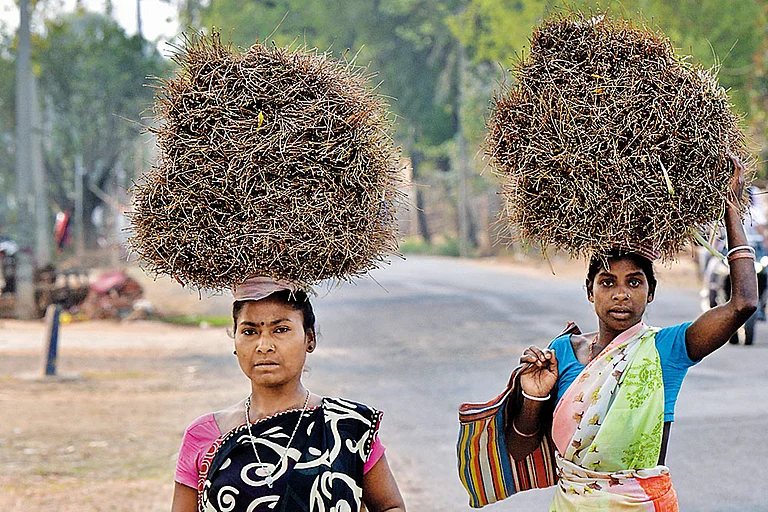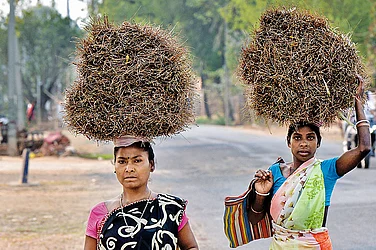For Vaishali Patil, a widow from Herwad village in Maharashtra, it was not an easy life after her husband's death in 2013. She not only faced discrimination in her family's financial matters, but was also kept away from social gatherings.
But, the 42-year-old woman defied the regressive age-old rituals of widowhood, wore colourful sarees and 'bindi' on forehead, and worked to gain respect and become financially independent.
She is now happy that Herwad village, located in Shirol tehsil of Kolhapur district, on May 4 passed a resolution banning the practice of women breaking bangles, wiping off 'kumkum' (vermillion) from the forehead and removing the mangalsutra of a widow as part of rituals.
It became the first village in Maharashtra to prohibit the practice. Talking to PTI, Patil, who is now local politician, recalled that once when was one of the organisers of a women's function, she had bought two sarees to be given to winners at the event.
"But, I wasn't allowed to do the honours as I am a widow. I couldn't bear this public humiliation and cried a lot. Ironically, those who disallowed me from conducting the felicitation were women themselves,'' she said.
Patil said she had faced discrimination in matters of family inheritance and social functions as well. "No woman should face the torture that I experienced after my husband died in 2013,'' she said.
Patil said she had also undergone the ritual of other widows coming to her house to wipe off her sindoor, breaking her bangles and removing the mangalsutra and toe ring.
"The women whose husbands are alive don't come near you for support. It is humiliating when you are grieving the loss of your husband,'' she said. But, Patil defied such practices even before the gram panchayat's decision to ban such rituals earlier this month.
"I wore colourful sarees and bindi. But, I don't wear the mangalsutra and the toe ring,'' she said. Patil said when her husband was alive, she used to go out to work as she was always interested in social causes. Later, in 2017, she contested the gram panchayat election, but lost by just 100 votes.
She had also served as the BJP's Shirol taluka president for three years, but says now she is an ordinary BJP worker. "More than what one wears, what is important is being given respect as a woman, irrespective of whether your husband is dead or alive," she said. Patil said more awareness about this will come if people allow a widow to participate in religious and cultural functions with respect.
"Recently, I attended a family function. I dressed well and went there happily, but heard gossips about how could I wear colourful clothes and bangles when my husband isn't there anymore. The society doesn't ask us (widows) how we have raised our children single-handedly, but if we try to live well, we are insulted," she rued.
Sunita Bargale, another widow from Herward who has two children, agreed with Patil that more than being allowed to dress well and wear jewellery, they need respect and dignity in society.
"The gram sabha resolution is the first step towards a pioneering social reform which I am proud of," she said. Bargale said even after her husband's death eight years ago, she puts a bindi on her forehead, but does not wear the mangalsutra.
Anita Kamble, a gram panchayat member, said as she is a widow, she was not allowed to participate in the wedding rituals of her children. "I had to stay behind and watch all the proceedings like a guest. I am still not invited for any cultural and religious functions," she said. She recalled how villagers taunted her when she contested the gram panchayat election and won.
"The taunts were about me being a widow. But, I want widows to be treated like other women and given respect," she said. Kamble said that after the gram panchayats resolution, some families did not subject the grieving wives to the humiliating widowhood rituals.
Another 26-year-old local and mother of two small children, Asmita Patil's husband succumbed to COVID-19 last year. "I got married in 2017, and my husband died of COVID-19 in 2021. My parents and in-laws supported me and told me there was no need to remove my bangles and mangalsutra if I didn't wish to. But, I discontinued wearing them as some elders from the husband's extended family asked me to remove them," she said.
Asmita said she did not have to go through the widowhood rituals last year as gatherings were not allowed due to COVID-19. The present generation is happy with the gram sabha order, But some elderly women do not agree with it, contending whether a dead man will become alive if his wife continues to wear jewellery, she said. Asmita says the government should come up a scheme for enabling widows like her to earn for themselves and their children.
(With PTI inputs)


























